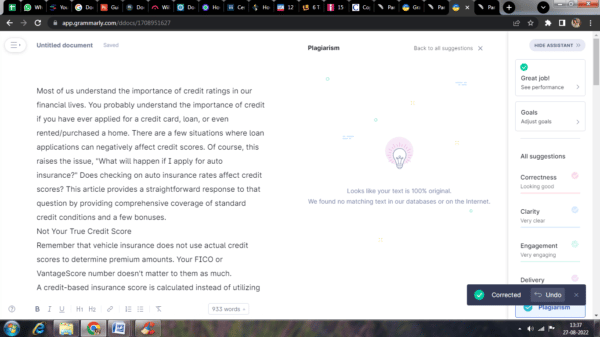Most of us understand the importance of credit ratings in our financial lives. You probably understand the importance of credit if you have ever applied for a credit card, loan, or even rented/purchased a home. There are a few situations where loan applications can negatively affect credit scores.
Of course, this raises the issue, “What will happen if I apply for auto insurance?” Does checking on auto insurance rates affect credit scores? This article provides a straightforward response to that question by providing comprehensive coverage of standard credit conditions and a few bonuses.
Not Your True Credit Score
Remember that vehicle insurance does not use actual credit scores to determine premium amounts. Your FICO or VantageScore number doesn’t matter to them as much.
A credit-based insurance score is calculated instead of utilizing the data found in your credit report. It looks at a wide range of information, much of which is redundant. There is a correlation between a large debt load and a high number of motor insurance claims.
On the other hand, your credit-based car insurance score is probably given less weight than your FICO score. The insurance company’s numerical rating of you, which is used to decide your premiums, is not something you will see.
If all insurance companies check credit
When you apply for automobile insurance, virtually every provider will check your credit. Car insurance firms that don’t follow industry standards will check your credit if they consider insuring you, regardless of whether you have a clean driving record or a history of accidents, tickets, or DUIs.
Theoretically, insurers will consider your credit rating when quoting you for affordable auto insurance. While the insurance company uses your score to predict whether or not they will pay out on a claim, your credit score indicates how likely you are to repay a loan.
When determining your insurance-based credit score, The Cheapest and Best California Car Insurance Companies employ their models. However, FICO takes into account the following information:
- Payment history (35% importance): Credit card, mortgage, and other debt repayments, as well as bankruptcies and late payments, all factor into the payment history percentage (35%).
- Current debt (30%): Having many accounts with a significant balance can indicate that you are utilizing too much credit and could negatively impact your credit score.
- Credit history length (15%): It is based on factors such as the age of your oldest account, the time since some accounts have been utilized, and the length of time other accounts have been open.
- New lines of credit (10%): The percentage of your credit score dedicated to new credit lines is 10%; opening too many new lines at once can negatively impact you.
- Types of credit (10%): This portion of your score rises when you establish a history of on-time payments across a wide range of credit accounts.
Facts: requesting a car insurance quotation will not affect your credit rating
Exactly what you heard. The myth must be exposed and debunked. When requesting low cost auto insurance quotes or sr22 insurance quote, you may notice a “soft inquiry” on your credit record. You may see who has been looking at your credit report and for what purposes by looking at the non-hard credit queries.
However, hard queries, such as a lender reviewing your credit before making a loan decision, have a more significant impact on your score than soft inquiries, such as requesting a vehicle insurance quote.
Credit Transfer
You can relax now that you know it won’t hurt you, but you may still have questions about some of the credit-related terminology we’ve been using.
The Credit Report
It’s like getting a grade in school. It’s a complete file detailing your credit history and can be used as a recommendation when applying for credit.
Credit Score
Compare your credit score to your grade point average. An “algorithm that calculates your creditworthiness based on the information in your report at one point in time” is what determines your credit score.
Hard Inquiries
Creditors and credit card companies review your credit report as part of the approval process, and these checks are known as “hard inquiries” or “hard pulls.” You’ll likely encounter them if you apply for a mortgage, loan, or credit card and will be asked to authorize each individual. Depending on the nature of the question, a rigorous investigation could result in a little drop in grade or have no discernible effect.
Soft Inquiries
Credit checks for background purposes and other lawful reasons are called “soft inquiries” or “soft pulls,” They are not considered hard inquiries. This could happen if, without your knowledge or consent, the credit card company examines your credit to determine whether or not you qualify for a particular credit card. Before hiring you, your potential employer may conduct a “soft inquiry.”
In contrast to hard inquiries, soft inquiries do not affect your credit score. The cheapest auto insurance quote fits under this category.
Conclusion
However, if you hang out in credit discussion groups long enough, you’ll hear complaints from people whose auto insurers pulled credit reports. Since the soft draw appears on the consumer’s credit report, it’s reasonable to anticipate that they will treat it as if it were a hard inquiry.






